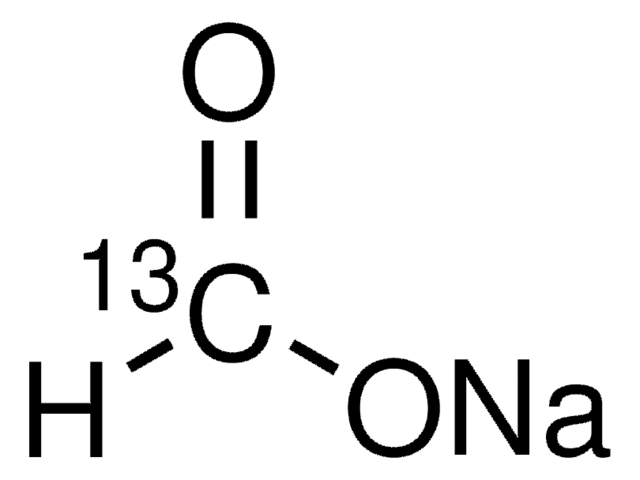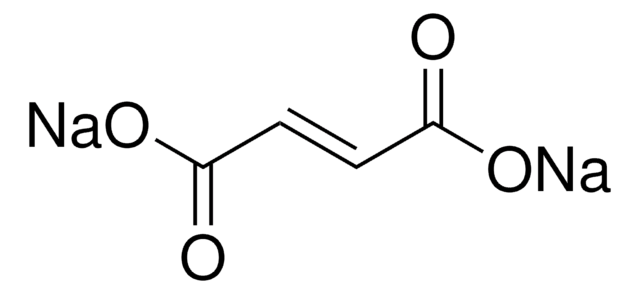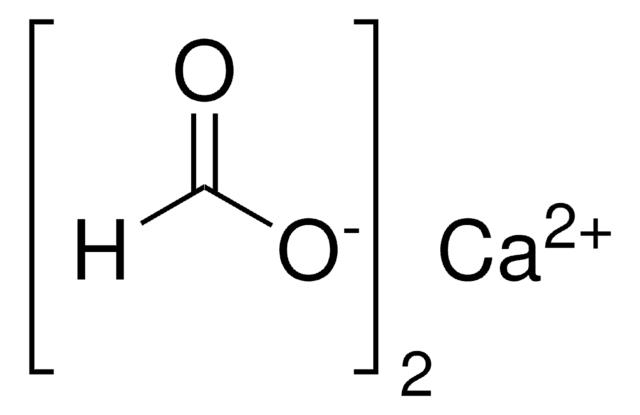71539
Sodium formate
BioUltra, ≥99.0% (NT)
Synonym(s):
Formic acid sodium salt
About This Item
Recommended Products
product line
BioUltra
Quality Level
Assay
≥99.0% (NT)
form
crystals
impurities
insoluble matter, passes filter test
pH
7.0-8.5 (25 °C, 1 M in H2O)
mp
259-262 °C (lit.)
solubility
H2O: 1 M at 20 °C, clear, colorless
anion traces
chloride (Cl-): ≤50 mg/kg
sulfate (SO42-): ≤50 mg/kg
cation traces
Al: ≤5 mg/kg
As: ≤0.1 mg/kg
Ba: ≤5 mg/kg
Bi: ≤5 mg/kg
Ca: ≤20 mg/kg
Cd: ≤5 mg/kg
Co: ≤5 mg/kg
Cr: ≤5 mg/kg
Cu: ≤5 mg/kg
Fe: ≤5 mg/kg
K: ≤500 mg/kg
Li: ≤5 mg/kg
Mg: ≤5 mg/kg
Mn: ≤5 mg/kg
Mo: ≤5 mg/kg
Ni: ≤5 mg/kg
Pb: ≤5 mg/kg
Sr: ≤5 mg/kg
Zn: ≤5 mg/kg
λ
1 M in H2O
UV absorption
λ: 260 nm Amax: 0.03
λ: 280 nm Amax: 0.02
SMILES string
[Na+].[O-]C=O
InChI
1S/CH2O2.Na/c2-1-3;/h1H,(H,2,3);/q;+1/p-1
InChI key
HLBBKKJFGFRGMU-UHFFFAOYSA-M
Looking for similar products? Visit Product Comparison Guide
Application
- Hydrogen-Bond-Mediated Formation of C-N or C=N Bond during Photocatalytic Reductive Coupling Reaction over CdS Nanosheets.: This study highlights the application of sodium formate as a reductant in photocatalytic processes, promoting the formation of key chemical bonds essential in synthetic chemistry, thereby providing a pathway for green chemistry applications (Zhang et al., 2024).
- The Pd (II) Reduction Mechanisms in Bacillus megaterium Y-4 Revealed by Proteomic Analysis.: This research uses sodium formate as an electron donor in bioremediation studies to reduce palladium ions, demonstrating its utility in environmental cleanup and recovery of valuable metals from waste streams (Li et al., 2024).
- Potential-Rate Correlations of Supported Palladium-Based Catalysts for Aqueous Formic Acid Dehydrogenation.: Investigates the role of sodium formate in enhancing the catalytic performance of palladium-based catalysts for the efficient conversion of formic acid, pivotal for hydrogen storage and fuel cell applications (Takanabe et al., 2024).
- Unexpectedly High Propylene/Propane Separation Performance of Asymmetric Mixed-Matrix Membranes through Additive-Assisted In Situ ZIF-8 Filler Formation: Experimental and Computational Studies.: Explores sodium formate′s effect in facilitating the synthesis of novel mixed-matrix membranes, which shows significant potential in gas separation technologies, particularly in the petrochemical industry (Jeong et al., 2024).
Other Notes
Storage Class Code
13 - Non Combustible Solids
WGK
WGK 1
Flash Point(F)
Not applicable
Flash Point(C)
Not applicable
Personal Protective Equipment
Regulatory Listings
Regulatory Listings are mainly provided for chemical products. Only limited information can be provided here for non-chemical products. No entry means none of the components are listed. It is the user’s obligation to ensure the safe and legal use of the product.
JAN Code
71539-500G:
71539-VAR:
71539-1KG:
71539-BULK:
Certificates of Analysis (COA)
Search for Certificates of Analysis (COA) by entering the products Lot/Batch Number. Lot and Batch Numbers can be found on a product’s label following the words ‘Lot’ or ‘Batch’.
Already Own This Product?
Find documentation for the products that you have recently purchased in the Document Library.
Customers Also Viewed
Our team of scientists has experience in all areas of research including Life Science, Material Science, Chemical Synthesis, Chromatography, Analytical and many others.
Contact Technical Service







